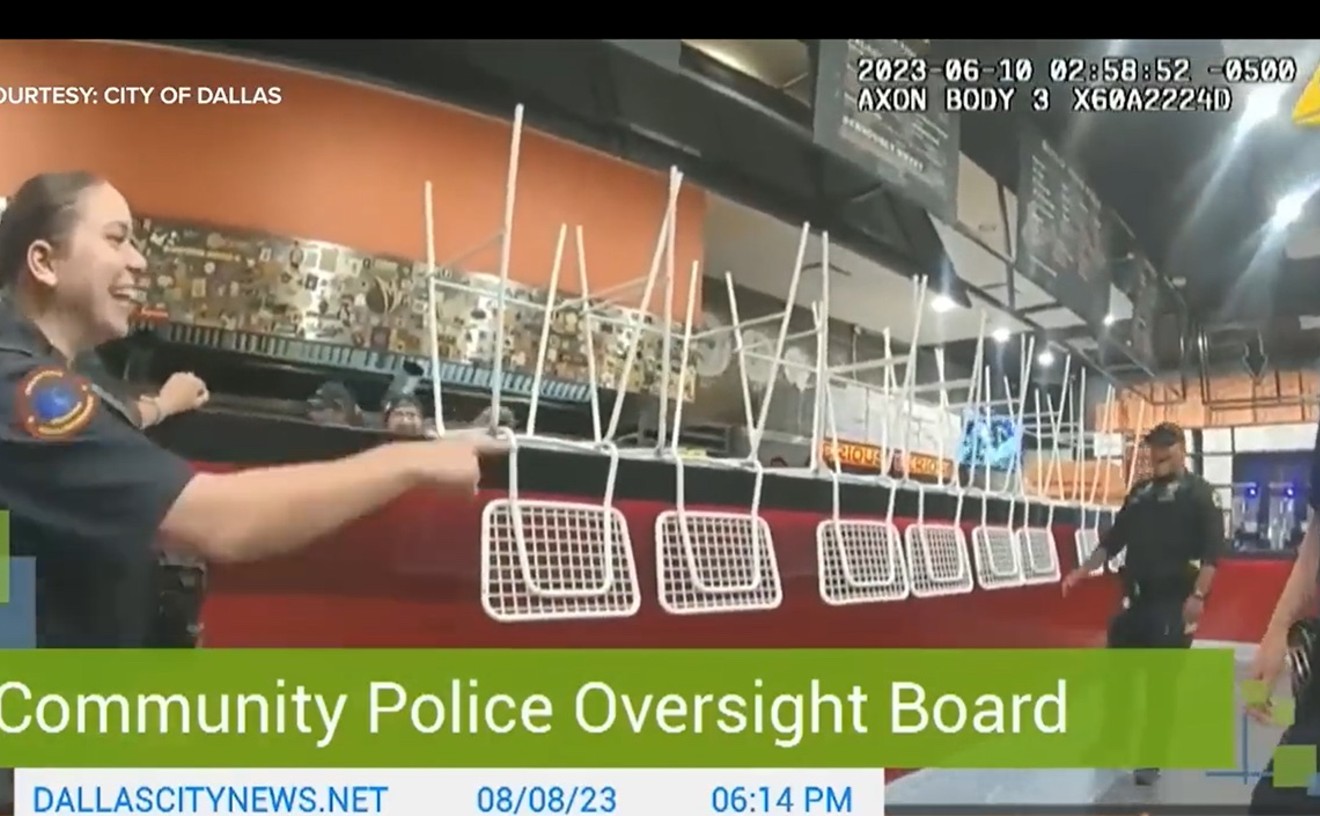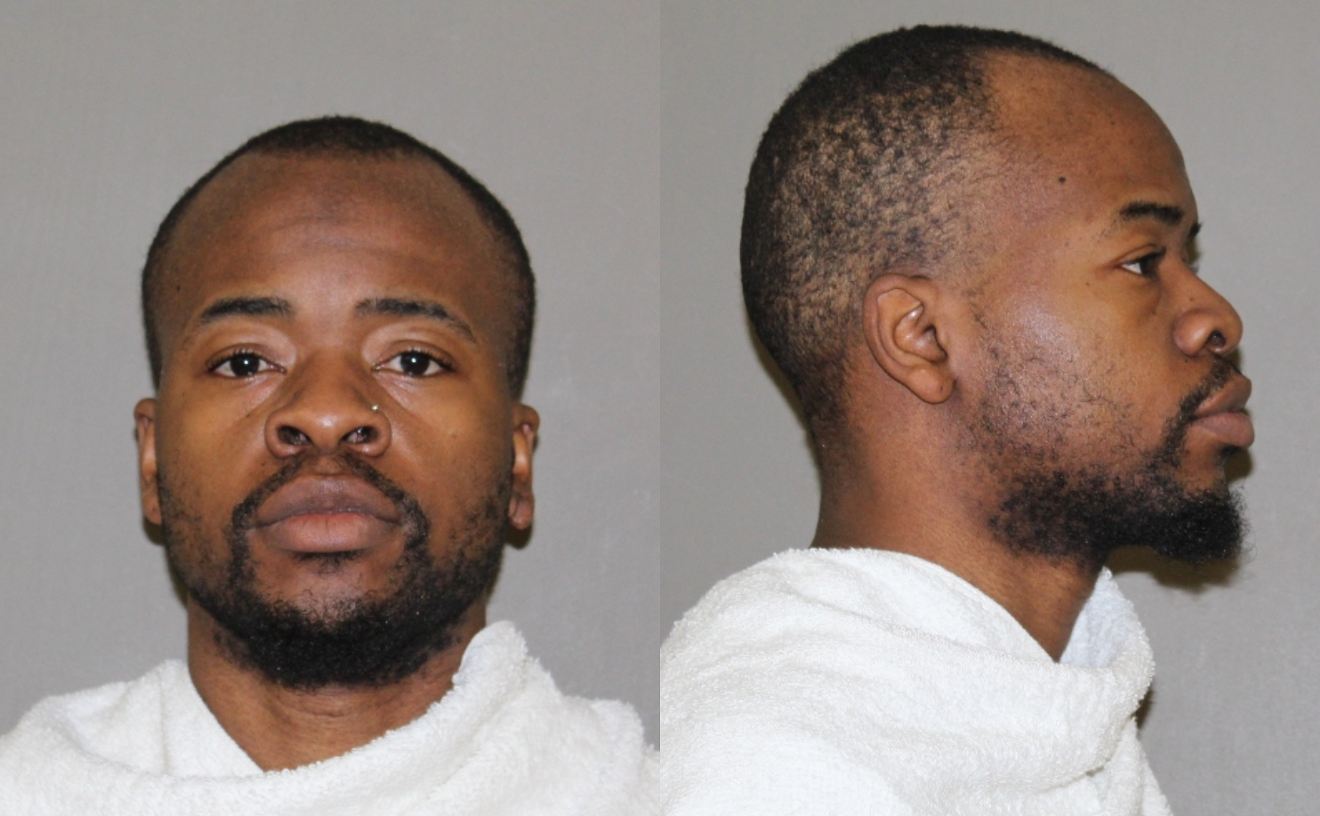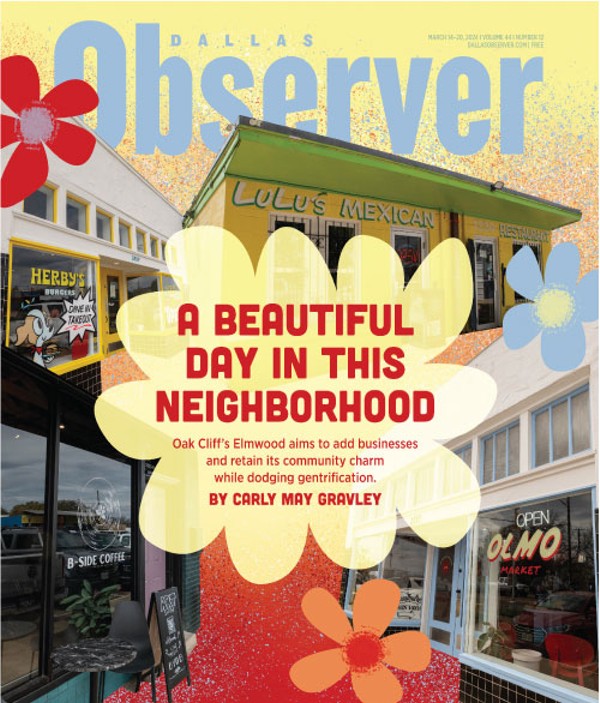Fort Worth's drowsiness more than a century ago led to an urban myth of sorts that a panther had wandered up from the Trinity River bottoms and was spotted sleeping on a downtown street. Even today, this carefully rebuilt and shiny place always seems to be waiting for more people to come and wake up to its wonders. But on a recent Sunday, any panther looking to catch a catnap would have had a tough time as a stream of 300 gay and lesbian protesters marched down the middle of an otherwise quiet Main Street en route to City Hall.
It was an odd sight for Cowtown's gay community, normally not a militant bunch. But, then, this time they had plenty to get militant about. Thanks to the now infamous June 28 raid on a gay bar south of downtown—on the anniversary of the birth of the gay rights movement, no less—Fort Worth's gays seemed ready to make some noise. A polite noise perhaps, and not too loud.
The July 12 demonstration was one in a series of protests following the police raid on the Rainbow Lounge in which six Fort Worth officers and two Texas Alcoholic Beverage Commission agents hauled 20 people from the bar and arrested six of them for public intoxication; one was treated in intensive care with a severe head injury, the result of police tactics that gay rights activists would label brutality. The incident was followed by a blitz of media accounts, thousands of angry e-mails and a gay rights outcry that uncomfortably thrust Fort Worth into a national and even international spotlight.
Taking-it-to-the-streets protests are new to Fort Worth's gay community, which has rarely appeared on the radar and has generally adopted Cowtown's low-key, live-and-let-live approach to life. Unlike Cedar Springs in Dallas or the Montrose in Houston, there is no gay ghetto, no place where flaunting one's gayness is not only countenanced but comfortable. Fort Worth gays were perfectly fine living their tranquil lives, that is, until the raid jolted them into activism, stirred the passions of the contented and perhaps changed their get-along agenda forever.
"A couple of weeks ago I never would have been in the street, let alone talking to a reporter," said Benjamin Guttery, a 24-year-old Army veteran who manages a jewelry store and who was detained in the raid. "This has lit such a fire in me. I have to defend myself." So he is toting a placard through Sundance Square that reads, "I WAS HOG TIED BY THE FWPD." In the oversized O he has drawn a pig's face and colored it a porky pink. It's the color of the day. Rally organizers from Queer LiberAction—a group of gay rights activists from Dallas committed, as their Web site says, "to directly, visibly and publicly confronting queer inequality and oppression"—sport pink bandannas in a more shocking shade.
Guttery's detention provides a glimpse of the harsh view one officer at the scene held toward the Rainbow Lounge and the gay-leaning South-side neighborhood where it's located.It was a new bar, open for just more than a week and different from the five other gay bars in town. There were bare-chested dancers who flaunted and strutted. Guttery and his partner had not been at the bar long. They were drinking on the outside patio when five officers arrived and began shining their flashlights in patrons' faces. "They said they were looking for underage drinkers," Guttery recalled. No one said anything, except one of the officers who mockingly remarked, "Oooo, it got real quiet out here." Guttery knew he shouldn't say anything but did: "That's because we are of age, officer." Immediately the officer wanted to know who spoke up, and when Guttery stepped forward, the cop told him to put down his drink and put his hands behind his back—he was being arrested for public intoxication. "I'm 6-8, 250 pounds and I had just finished my second drink," Guttery said. "I might have had enough to have a loose tongue but not a loose walk or anything like that."
Guttery said he was roughly "bulldozed" through the bar crowd and loaded into a paddy wagon filled with Hispanic men from the Rosedale Saloon and Cowboy Palace, two bars that were "inspected" earlier in the evening by the same squad. After he sat in the locked van for about 30 minutes, the doors swung open and a Fort Worth police officer ordered him out onto Jennings Avenue, outside the bar. He was about to be let off the hook.
One of Guttery's drinking companions was his nephew who works for the city. He dropped the name of a police supervisor to one of the officers at the scene and led him to believe Guttery was a city employee as well. "The officer that let me go said that city employees shouldn't be hanging around this part of town, which I took to mean the gay area of town," Guttery recounted. "That's absolutely ludicrous, but that's what he said."
A few of the men who were at the bar that night touched off the fast-rippling reaction to the raid only hours after it occurred.
Chuck Potter, 43, was at the bar dancing to the thumping music, chewing ice in lieu of drinking and was so preoccupied that it took him awhile to realize that officers were in the bar. It seemed to Potter that if you made eye contact with police, "you were the next target."
It struck him that the police were being far more physical with those being detained than the situation required. "An officer had [one man] up against the wall, and he was pulling his neck back while another one was trying to get his arms behind him. I thought they were going to break his neck," Potter says. "When they let him off the wall, he kind of stumbled a little bit and they tackled him, body slammed him into the ground face first."
A moment later Potter eased his cell phone camera from his pocket and snapped a photo that within days was being carried by news sites and blogs around the world. It was grainy eyewitness evidence of Fort Worth police and state agents roughing up Chad Gibson, a 26-year-old computer technician who was hospitalized for a week with serious head injuries inflicted during the raid. The photo shows TABC Agent Christopher Aller crouching over Gibson, who is face-down on a hallway floor.
"When I left the bar and got home, I was so mad. I just couldn't believe what had happened," says Potter, who works in AIDS-HIV education and for 25 years has considered Fort Worth his welcoming home. "At three in the morning I started texting everyone I know, maybe a couple hundred people," he says. "I went to sleep but got up early because so many people were calling." Everyone, he says, expressed the same initial reaction: stunned disbelief.
At the same time, Todd Camp, a former journalist and founder of QCinema, Fort Worth's Gay and Lesbian international film festival, was creating a Facebook page dedicated to publicizing the raid and sharing his own sober account of what he saw at the bar that evening. "It was so random, so aggressive, I couldn't believe what I was seeing," he later says, referring to the police conduct. "They were agitated, rude, shoving people. It wasn't, 'Excuse me, sir, I think you've had too much to drink.'" By the afternoon following the raid, Camp and others had contacted local newspapers and TV stations and organized a protest that evening on steps of the historic Tarrant County Courthouse.
Fueling the situation was the fact that the raid fell almost to the hour of the 40th anniversary of the Stonewall riots in New York City, an event considered the birth of the lesbian/gay/bisexual/transgendered rights movement when patrons of a Greenwich Village gay bar fought back against a police raid. So it flew instantly onto the radar of gay groups and individuals who were marking the day with parades and other events around the country.
Just as incendiary was a police press release issued on the day of the raid that defended the police conduct by claiming that two intoxicated patrons made "sexually explicit movements" toward an officer, and a third patron, which turned out to be Gibson, "assaulted the TABC agent by grabbing the TABC agent's groin." Fort Worth Police Chief Jeffrey Halstead, elaborating on the point, told reporters the next day, "You're touched and advanced in certain ways by people inside the bar, that's offensive." He was quoted further as saying, "I'm happy with the restraint used when they were contacted like that." A department spokesman said later that the remark was taken out of context.
To many, that sounded like the "gay panic" defense bigots have summoned when trying to legally justify a bashing. Gibson has denied touching Aller, and numerous witnesses at the bar say the suggestion that anyone touched or threatened the heavy-handed cops was pure fiction.
Nearly as irksome to gays in Fort Worth was the six-day silence of Mayor Mike Moncrief, a businessman and oil heir who gays and lesbians generally supported with votes and campaign money during his three terms in office. When he finally spoke publicly, he expressed confidence that the chief was leading a thorough internal investigation, one he had asked U.S. Attorney James Jacks to review when it was finished.
Fort Worth City Council's one openly gay member, Joel Burns, had the support of only one other colleague on the nine-member council in his call for an independent investigation free of the inherent questions of bias that would come with police and the TABC investigating themselves.
A new group calling itself Fairness Fort Worth, led by lawyer Jon Nelson, formed around the goal of conducting this independent inquiry. At the same time the group moved to pressure city officials, it also hoped to tone down the media's rhetoric. As business tycoon Warren Buffett has said, "It takes 20 years to build a reputation and five minutes to ruin it." Gay Fort Worth, as much as any segment of the community, was horrified by the city's newly minted reputation as a homophobic backwater. And yet as angry as they were at the place where they lived, they found themselves coming, in some ways, to its defense.
"I had an L.A. Times reporter call me and say, 'It must be tough to be you, to be gay and live in Fort Worth, Texas,'" says Burns, who works in real estate and moved to the city from Lubbock. "I told him I chose this city. We looked at Portland and Seattle and Austin and Washington before we moved here. It's a wonderful place."
Camp, who some have begun calling the mayor of gay Fort Worth because he is so plugged into the arts community, says, "It didn't take long for this anti-Fort Worth sentiment to build on the blogs. It was, 'Fort Worth sucks. We should boycott the city.' It wasn't fair or accurate to blame the entire city or the police. This was not typical of the police."
Fort Worth had been given "a big black eye," Camp adds. As someone whose film festival brings people in from around the country, he says gay interests, including his, may end up suffering most. "We were just starting to get somewhere," Camp says. "Now Fort Worth is the place where they beat up queers and drag them out of bars."
----
Low-key, coupled-up, confined to no one neighborhood but not so bold as to head into Billy Bob's honky-tonk holding hands, Fort Worth gays live somewhat cautiously. There is an annual gay rodeo and a gay pride parade with floats one participant called pathetically middle-school. Locals like to say Fort Worth people will look past most anything "as long as you don't do it in the street and scare the horses," but hard-edged attitudes are easy to find.
"I get called 'faggot' at least once a week," says Bruce Wood, 49, whose life in Fort Worth has taken him into the two sides of the city it promotes most heavily: cowboys and culture. For 10 years, until 2006, he ran the Bruce Wood Dance Company, a modern dance outfit that performed in the city's best venues. He grew up in small-town Jacksboro, Texas, where he learned to rope and ride "when I wasn't getting beat up." Today he works in a high-end Western wear shop downtown.
Raising money for an arts organization is never easy, but doing it as an openly gay man in Fort Worth is harder still, Wood says. "One donor asked me over and she said, 'Of course it isn't me, but my friends think you act too gay in public' and that I really needed to fire all the gay men who worked for me," he recalls. "I said no, and it cost us $25,000. Of course, there are some gracious, wonderful people, but there are a lot of homophobes who want nothing to do with you at all."
Frank Provasek, a coin dealer who has been involved with Tarrant County Lesbian and Gay Alliance since it was formed in 1980, says that in the '70s and earlier, gay bars were randomly subjected to raids "with police putting everyone in paddy wagons and taking them off not only on public intoxication charges but for same-sex dancing, holding hands or maybe there was a lady who had hair too short, wearing pants, and she had to prove she wasn't a cross-dresser."
In the 1980s, he says, police moved on to placing fake personal ads in gay magazines to entrap homosexuals on sodomy charges. The police chief at the time, Thomas Windham, put an end to that tactic "and relations with the police have been good for at least 20 years," he says.
The Lesbian and Gay Alliance was instrumental in getting Fort Worth in 2000 to amend its anti-discrimination ordinance and prohibit discrimination against gays in employment, housing and places of public accommodation. It became the second city in the state to pass a gay protection measure, 25 years behind Austin. Dallas followed suit in 2002. The Texas Legislature, dominated for more than a decade by social conservatives, has not joined in.
Life in the city means confronting "the occasional redneck," "one asshole neighbor" or "some of the old folks down at the beauty parlor who are prejudiced against gays, blacks, everybody," a smattering of interviews reveals. Mostly, though, it's a place where people politely hold their tongues, making it difficult to tell what they think.
In some of the unlikeliest places, like the conservative, ultra-conventional suburbs northeast of the city, you can also find gay couples such as Robert Curle, a 41-year-old flight attendant, and Gary Agee, a 48-year-old horse trainer, who have been together for 19 years. They were surprised to find five other gay couples living in their neighborhood in suburban North Richland Hills. Several work for Fort Worth-based American Airlines, which solidified its gay-friendly reputation when it stood up to some of the nation's top anti-gay crusaders a decade ago.
In 1998, the Southern Baptists, Donald Wildmon's American Family Association, Gary Bauer's Family Research Council and Beverly LaHaye's Concerned Women for America threatened American Airlines, Fort Worth's largest company, with boycotts if it continued the practice of marketing to gays and lesbians and sponsoring gay, lesbian and AIDS-related organizations. The policies, the groups said, imperiled the sanctity of the family. Not only did American stand fast, in 2000 it became the first major airline to begin offering the same benefits to same-sex domestic partners as it does to married spouses.
----
The closer one gets to Sunday morning in the city, the bigger an issue being gay becomes. Dust-ups rooted in the culture war that religious conservatives continue to wage against homosexuality often flare in the city.
There are a few LGBT churches, but as Stephen Sprinkle, a professor at Texas Christian University's Brite Divinity School, points out, many gays in the city grew up in West Texas and remain tied to the Southern Baptist tradition. "But [when] two guys living together, not the most open people but who love each other, show up as a couple on picture day at the Broadway Baptist Church, and all hell breaks loose," Sprinkle says.
The 2,000-member church sidestepped publishing the photos early this year but the matter revealed that openly gay members were serving on church committees. As a result, in June, the Southern Baptist Convention broke its 127-year-old ties to the church, declaring its stand on homosexuality to be too lenient.
Broadway Baptist's most famous congregant, 75-year-old concert pianist Van Cliburn, has been attending services for years with male partners, members say. Conforming to mores that persist among the city's moneyed set, he has never discussed his sexuality in the media. He was outed in 1996, however, when his partner, a mortician, filed a palimony suit saying they had been intimate for 17 years.
For most church positions, and in the webs of nonprofits that spread from them, "I would suggest you not be open if you want the job," says Sprinkle, the divinity school's first openly gay, tenured professor whose duties include placing students in local churches and church organizations. In a city so steeped in fundamentalist Christianity—home to the Southwestern Baptist Theological Seminary and an Episcopal diocese that split from the national organization last year as a protest against acceptance of same-sex unions and the ordination of women—Sprinkle believes religious anti-gay biases infect other aspects of life in the city. "Let's not candy-coat it," he says. "We're in the Bible Belt. This isn't San Francisco. There is a lot of denial that goes on in the LGBT community here and a lot of places, Houston and Dallas included."
If there is a statistical measure to back up Sprinkle's conclusion about attitudes, it might be the November 2005 vote on a Texas constitutional amendment banning gay marriage. In Tarrant County, the ban passed by an overwhelming 76 percent, compared with 66 percent in Dallas County and 72 percent in Harris County. Travis County—Austin, again—was the only jurisdiction in the state to reject the amendment, with just 41 percent voting in favor of it.
Against that backdrop, there are things about the newly opened Rainbow Lounge that, in Cowtown parlance, might have spooked the livestock. Unlike the city's existing gay bars, the Rainbow Lounge featured dancers, "6 boys, 5 ladies and one diva," as the June 19 opening night poster put it. The flyer shows half a dozen muscle-rippling men in bikini briefs and come-hither looks, plus a zaftig drag queen named Whitney Paige.
The entertainers dance on platforms and collect tips in their skivvies. Several attracted the attention of TABC Agent Aller, who was outside the bar two nights before the raid, according to his account in a TABC internal investigative report released two weeks ago.
Peeking through a fence, Aller said, he spotted "two males dressed only in thong-like underwear or bikini bottoms sitting on some picnic tables. As [Aller] continued to view the area, he noticed the male subject who earlier identified himself as the owner entered the patio area and quickly made his way to one of the individuals in the underwear and whispered in his ear. Aller said the male subject got up and ran inside." He "believed the subject's actions were odd and could indicate the possibility of drug activity or lewd conduct."
He could have easily reached a more innocuous conclusion—say, the boss told the dancer, "Break's over, get to work!" Only he didn't; he was law enforcement and his suspicions were aroused.
Aller is the same agent who, during the bar "inspection" two nights later, claimed Gibson "slapped" him in the groin in a hallway near the bathroom, which he said prompted what turned into a struggle over his arrest. One sober witness at the bar that night who scribbled down several pages of notes immediately after the incident says that's not true. Tom Anable, a CPA who was waiting for the bar to close that night to go over its books, says Aller "walked straight through the bar near where I was standing and tapped Chad Gibson on the shoulder. At that point Mr. Gibson turned. I was about 12 feet away...I could not hear him, but I could see him mouthing the word, 'Why.' They were in perfect profile to me where I was standing. There was at least 18 inches of space between them. I can tell you Chad Gibson never groped that officer."
Anable then saw Aller "grab Chad's hand, twist, turn him around, grab his collar and drag him off that step...There was no resistance from Mr. Gibson. After he had him pinned to the wall, he called for assistance. He stepped back, turned and threw him very hard on the floor."
----
Getting the job of truth-seeking beyond the hands of the Fort Worth Police Department and an internal TABC review quickly became the chief goal of Fairness Fort Worth and Queer LiberAction, the most visible organizations giving sustained attention to the raid. But the difference in style and tactics between the homegrown group and the Dallas rights organization could not have been starker.
"We see all these events in the past month as part of our civil rights movement, our struggle," says Blake Wilkinson, who founded Queer LiberAction last November. "Fairness Fort Worth sees it differently. The message in Fort Worth is tone it down, let's calm down...It isn't time to tone it down. It's time to make as much noise around this as possible."
Wilkinson's group, which has organized "queer kiss-ins" on downtown Dallas streets, received little support from the audience of gays and others who packed the Fort Worth City Council chambers for its July 14 meeting, its first after the raid. A few minutes into the proceedings, Wilkinson began interrupting, demanding that the Rainbow Lounge matter be moved up on the lengthy schedule. "We're tired of being told to sit at the back of the bus," Wilkinson shouted over calls for order by the mayor. "We're sick and tired of being put at the end of the list." A man wearing a yellow Fairness Fort Worth button stood up next to Wilkinson and began shouting: "You're embarrassing me."
A few minutes later, at Councilman Burns' urging, the mayor ordered Wilkinson and five others to leave the building. "I thought the mayor was more than generous before encouraging him to go back to Dallas," Burns says later. Not only would the issue be hashed out by Fort Worth people, he suggests, it would be done without the shouting that has come out of Dallas meeting rooms over the years, where race often generates the heat.
Near midnight, Nelson of Fairness Fort Worth, dressed in a suit and tie, got down to the business of making his organization's case for an independent investigation, one that would overcome the doubts cast by Chief Halstead's initial remarks.
The 63-year-old lawyer, who came out as gay five years ago after being married 34 years, prefaced his comments by telling the council about a hate-filled e-mail someone sent to lawyers around town recently. It came from an anonymous person upset over a lawsuit Nelson had been working on for the national Episcopal Church, which sought to strip the breakaway diocese in Fort Worth of its property. The subject line read, "How does Jon Nelson find time to sodomize his gay lover?"
Fort Worth has made a lot of progress toward inclusiveness, he told the council. "But as with any city, there remains an underbelly and the events of the Rainbow Lounge brought that to light."
----
On August 6, the TABC released an internal report citing 19 policy violations by two of its agents and their supervisor. The agents did not have their supervisor's approval to go to the Rainbow Lounge and failed to submit paperwork establishing a reasonable cause to enter the bar, the report concludes. The state agency's report did not draw conclusions about the use of force, which is the subject of a second TABC probe.
On August 18, the Fort Worth police issued a press release updating the results of its own ongoing, internal investigation, which has "revealed that a flawed policy created a situation that would not have occurred otherwise at the Rainbow Lounge." The eight-page press release states the Rainbow Lounge incident "has provided the police department with an opportunity to learn and grow" and police are committed to establishing "better communication" with the LGBT community. The department has already interviewed 35 witnesses, 10 officers and reviewed the TABC report. Yet four allegations remain under investigation against Fort Worth police officers: excessive force, unprofessional conduct, neglect of duty and failure to supervise. By law, the department has until December 28 to complete its investigation.
The Fort Worth council, meanwhile, dropped its reluctance to pursue an independent investigation and voted with little discussion on July 21 to ask the U.S. Attorney's Office to take the job. "They'd been concerned most about appearing unsupportive of the police," council member Burns says, but the mayor had received advice from the city attorney and others about the need for an outside investigation. The plan they approved was left in the air, however, when U.S. Attorney Jacks said in early August he would not conduct a separate investigation but would follow up on any violations of federal laws.
Gibson hired a lawyer and stopped giving comments to the media. A new gay liaison was installed at the police department and a diversity task force geared up at the city.
The anger and frustration Fort Worth's gay community displayed in the weeks after the raid has abated somewhat. The give-no-quarter, continual revolution of Queer LiberAction doesn't fit its style. But something has changed. It is difficult to go back to acting as though nothing is wrong.
"We've accomplished a lot," Camp says. "This city as a whole has been very live and let live. The way this thing has blown up, a lot of us have gotten to point of thinking that isn't good enough. We're asking Fort Worth for more."










